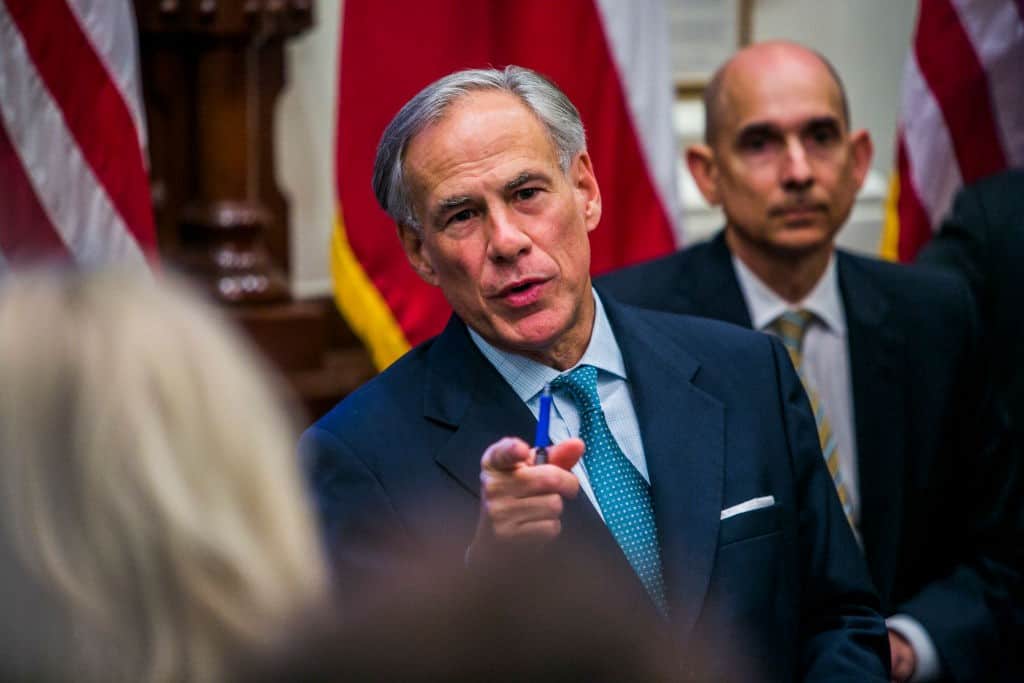Gov. Greg Abbott has picked a very public fight with the City of Austin over its homelessness problem– and it’s revealed plenty about the governor.
In a show of cruelty last month, Abbott initiated a mass forced relocation, ordering TxDot workers to clear the makeshift homes of Texans living under the city’s underpasses and directing them to at-capacity shelters– right around the time temperatures in Texas began to drop.
The governor’s big solution, which came after weeks of feuding with Austin’s mayor and promising to use “every applicable state agency” to solve the crisis, was this: a five-acre plot of concrete for the city’s homeless population.
In a strongly-worded letter to the governor earlier this month, the Texas Homeless Network blasted the governor for squandering state and federal resources, and for trying to hide homelessness rather than solve it. “Establishing a sanctioned encampment gives the appearance that the State is taking a path that addresses homelessness. In reality, it only pushes the problem down the road,” read the letter, co-signed by several other Texas nonprofits that fight homelessness in the state.
And while plenty has been said about Abbott’s misguided approach to Austin’s homelessness –that is to say, sweeping the problem under the rug– not enough pressure has been placed on the governor to use all the tools at his disposal to actually solve homelessness throughout the state.
The outrageous truth for Texans, especially the 25,000 Texans who experience homelessness on any given night, is that Abbott has the means and resources (a $250 billion state budget to be exact) to put an end to homelessness in Texas.
“Homelessness as an issue is complex, but it also comes down to this very simple thing: people should have a place to live,” Cossy Hough, an associate professor with the University of Texas School of Social Work, told the Signal. “If politicians in Texas wanted the housing issue to be solved, they could solve it.”
“Having a 0 percent homeless population is possible. You just have to house them,” she said, citing several cities in the U.S. that have already ended chronic homelessness.
Study after study has shown that the cost of not acting on homelessness comes with a hefty price tag. SEARCH Homeless Services, a shelter in Houston, has estimated it costs taxpayers $90,000 per unhoused person due to costs associated with public services, emergency rooms, and jails. According to SEARCH, it would cost $55,000 to house each homeless person with supportive services, ultimately leading to $35,000 in taxpayer savings.
Other estimates are more extreme, like one in Travis County that found it costs taxpayers an annual $222,000 in county services per homeless person. Nationwide, 150,000 chronically homeless people in the U.S. cost taxpayers almost $11 billion in public funds every year. Housing all of them would cost taxpayers much less, around $7.8 billion.
Abbott and his colleagues in the Texas Legislature have taken no serious steps to address the issue of homelessness statewide. That includes failing to raise the state’s minimum wage, pretending the state’s Rainy Day Fund does not exist, and failing to adopt other measures that would make the lives of working-class Texans easier and cheaper, like declining $100 billion in federal funding to pay for the healthcare of impoverished Texans or attacking healthcare providers like Planned Parenthood.
During this year’s Texas Legislature, several Democratic bills that would have worked to make housing more affordable died in their Republican-led committees. Another 15 bills that attempted to raise the minimum wage beyond $7.25 also died in committee.
One can imagine an alternate reality where the governor, rather than putting more money into militarizing the border and railing against the Obama administration to make up the cost, instead uses state dollars to try and house all Texans while at the same time railing against the Trump administration to act on affordable housing.
It’s clear that Abbott, who appears to only care about homelessness in Austin because he lives and works there, won’t be helping Texas’ most vulnerable anytime soon. Sadly, not out of complexity or fiscal consideration, but because he lacks the political will and compassion to do so.
Photo: Getty Images
Fernando covers Texas politics and government at the Texas Signal. Before joining the Signal, Fernando spent two years at the Houston Chronicle and previously interned at Houston’s NPR station News 88.7. He is a graduate of the University of Houston, Jack J. Valenti School of Communication, and enjoys reading, highlighting things, and arguing on social media. You can follow him on Twitter at @fernramirez93 or email at fernando@texassignalarchive.com





